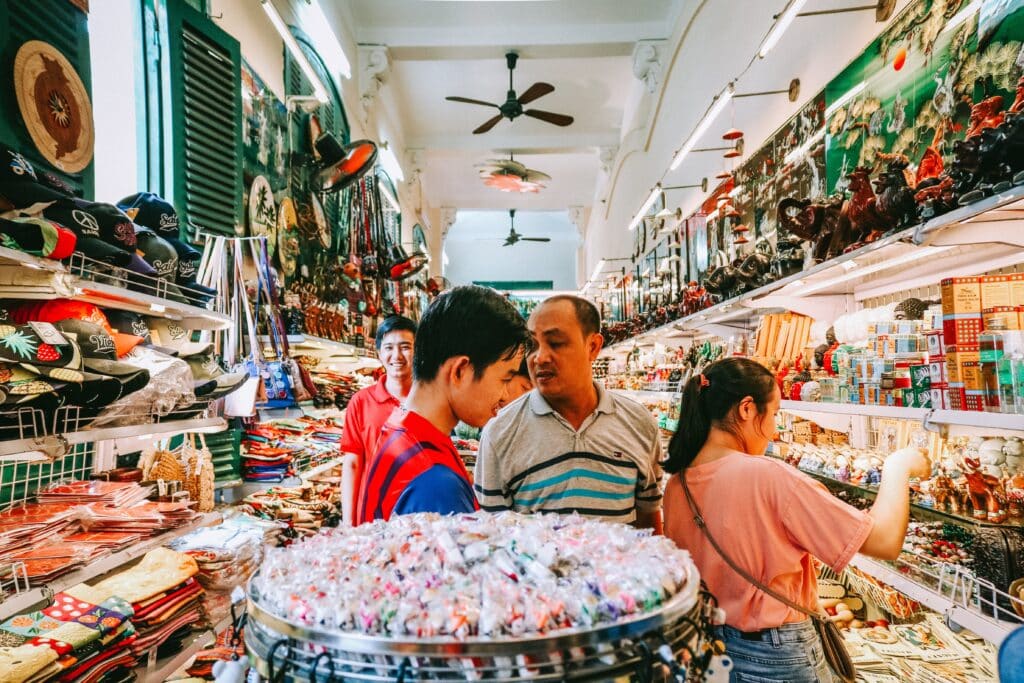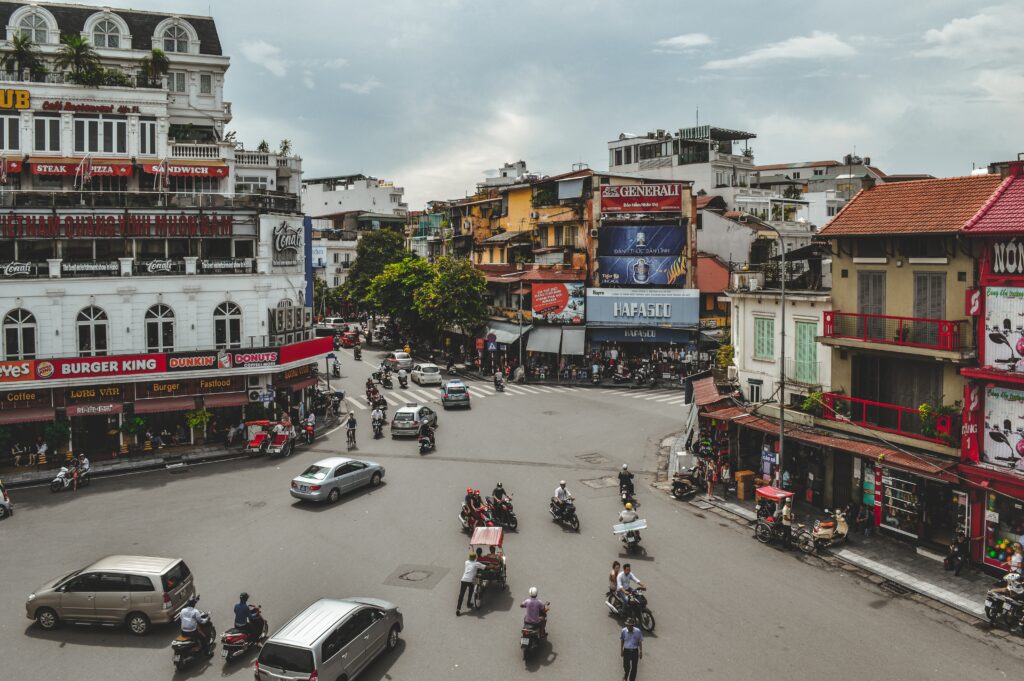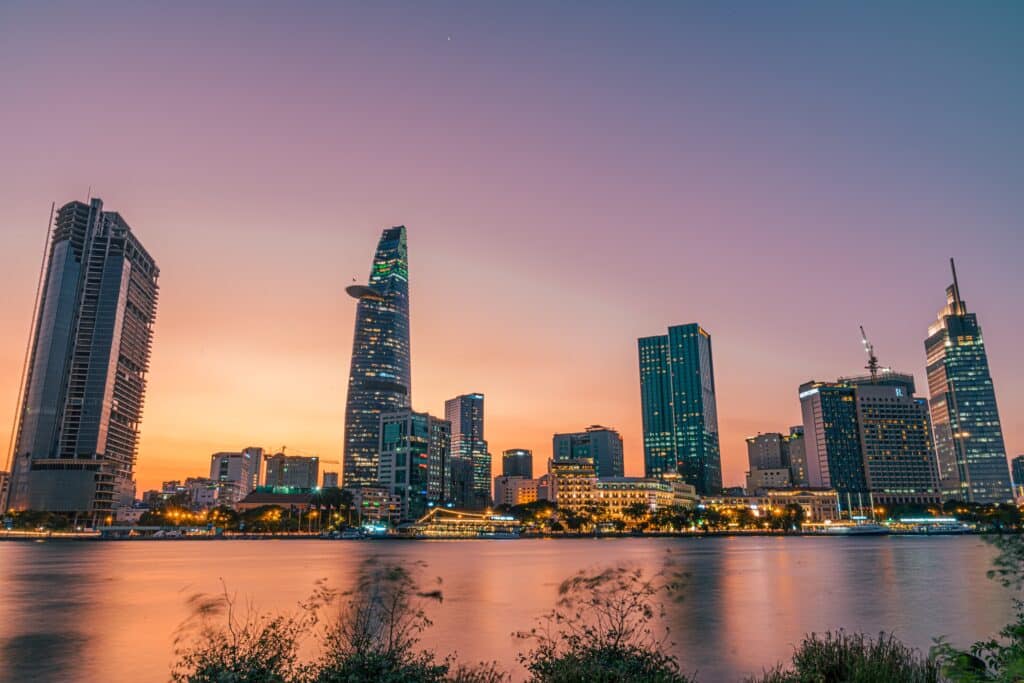Pleasant climate, breathtaking scenery and friendly people: Vietnam has a lot to offer. Whether you’re a digital nomad or an expert with a professional opportunity, the energy of this country will seduce you. Vietnam has a young population, a low cost of living and is enjoying strong growth. That’s why the country’s major cities attract so many foreigners. Want to find out more? Discover Foyer Global Health’s complete guide to expatriating to Vietnam!
Why expatriate to Vietnam?
Every year, people from all over the world choose Vietnam for their expatriation. And with good reason: this youthful, dynamic country is brimming with opportunities. Beyond its magnificent and diverse landscapes, French and international expats often note Vietnamese hospitality towards foreigners.
The cost of living in Vietnam is relatively low. For example, it’s around 50% of the cost of living in France. For an European person, the budget for living in this country therefore largely depends on his or her level of spending. Expect to pay between 25 and 40 million dongs for the level of comfort that most expats seek in Vietnam.
This represents a monthly cost of between €955 and €1,529 to live in one of the country’s major cities. The pleasant climate and excellent level of security are other strong arguments for expatriating to Vietnam. What’s more, while the local language can be difficult to learn for foreigners, more and more Vietnamese are mastering English.

How do I obtain a visa to expatriate to Vietnam?
Expats wishing to rebuild their lives in Vietnam must obtain a work or study visa. Depending on your situation, your company or Vietnamese host organization will take care of the formalities. Would you like to live in Vietnam without working? Whether you’re retired or unemployed, you’ll generally need to obtain several tourist visas.
Vietnam’s electronic visa, or e-visa, allows you to stay for up to 90 days with multiple entries. You will then need to leave the country to make a new application. Note that French nationals can spend up to 45 days in Vietnam without a visa. This authorization applies to several other countries, including Germany, Spain and Italy.
This is a good opportunity to discover the different cities of Vietnam, before a possible expatriation. If you have any doubts or questions about Vietnamese visas, consult your embassy’s website.
How can I find a job in Vietnam as an expat?
Although the job market is doing quite well in Vietnam, it is sometimes difficult to find a job as an expat. Indeed, the country has tightened its regulations on foreign workers, notably by modifying its definition of an expert. To find work in Vietnam, it is more than advisable to have in-demand skills and a good command of English. The IT, education, catering, manufacturing and health sectors are all interesting possibilities.
Which city should you choose to live in Vietnam?
Whether you’re planning a trip of a few months or a real expatriation, Vietnam has many attractive cities for foreigners. Nha Trang and Da Lat are particularly popular with international expats. Choosing a smaller city or a less touristy location means you can take advantage of attractive prices.
However, expats generally tend to settle in Saigon or Hanoi. The country’s two largest cities offer quality Internet connections and a livelier cultural and nightlife scene. They are also the best choices if you entered Vietnam on a tourist visa and are looking for work.
Hanoi: choosing the Vietnamese capital for your expatriation
Hanoi is a perfect blend of tradition and modernity. Expats with a love of culture and good food will find plenty to like here. Less dynamic than Ho Chi Minh City, Hanoi has a harder time attracting new businesses. Vietnam’s capital does, however, offer a lower cost of living than Saigon.
The districts of Tay Ho, Long Bien, Truc Bach and Ciputra are particularly popular with expat families. Single people in search of a little excitement are generally happy in Hoan Kiem, Hai Ba Trung or Ba Dinh. Near Halong Bay, Hanoi is a good choice if you’re looking for an authentic Vietnamese experience in a big city. Consult agency websites such as Expat Housing or Hanoi Housing to find your new home.

Ho Chi Minh City (Saigon): opting for modernity and dynamism
Sometimes still referred to by its historic name of Saigon, Ho Chi Minh City is often the first choice of foreign expats. Vietnam’s economic capital is, in fact, very attractive to those seeking an active lifestyle. You’ll find plenty of cafés, English schools, local and international businesses and coworking spaces.
While prices are higher than in Hanoi, Saigon offers a lively nightlife and plenty of activities. Among the districts most popular with expats are Districts 1, 2 (Thao Dien), 7 (Little Seoul) and 9.

How good is the Vietnamese healthcare system?
While Vietnamese healthcare facilities continue to improve the quality of their services, many expats remain dissatisfied. The annual Expat Insider 2022 survey reports disappointment with the quality, availability and accessibility of healthcare. If the healthcare system is still underperforming, private clinics offer a good alternative.
For residents of the Vietnamese capital, embassies recommend these three health care establishments in particular:
1. Hanoi French Hospital, located at Số 1 Phương Mai, Đống Đa, Hà Nội 100000 ;
2. Family Medical Practice, located at 298I P. Kim Mã, Kim Mã, Ba Đình, Hà Nội ;
3. The Raffles Medical Hanoi, located at 51 Đ. Xuân Diệu, Quảng An, Tây Hồ, Hà Nội.
On the Saigon side, consulates also offers a list of recommended structures, such as :
1. The International Medical Center (CMI), located at 30 Phạm Ngọc Thạch, Ward, Quận 3, Thành phố Hồ Chí Minh ;
2. The two Family Medical Practices, located in Districts 1 and 2 ;
3. The Franco-Vietnamese Hospital (FV Hospital), located at 6 Nguyễn Lương Bằng, Tân Phú, Quận 7, Thành phố Hồ Chí Minh.
While these private clinics have a better reputation than Vietnamese public health care establishments, their services are relatively expensive. This is why the French Embassy strongly advises you to take out international health insurance for expats in Vietnam. Visit its website to find out about all the private health establishments in the capital. The website of the French Consulate General in Saigon lists the main private hospitals and clinics in the country’s economic capital.
Which school to enroll your children in Vietnam?
Depending on the city and neighborhood in which you settle, you’ll have several options for sending your children to school:
1. Enroll them in a school offering a program in English
2. 100% Vietnamese schooling in a traditional school;
3. Opt for complementary distance learning
Once again, consulate and embassy websites often list the main schools in Saigon and Hanoi.
Some ideas of places to discover in Vietnam
Looking for suggestions of places to visit during your stay in Vietnam? To make the most of your expat experience, take the time to discover these must-see places:
- Hạlong Bay
- Phú Quốc Island
- the citadel of Hué
- the rice fields of Sapa
- the seaside town of Nha Trang
- Hanoi’s Temple of Literature
